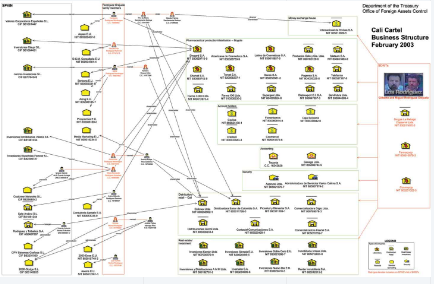The Mexican authorities are struggling as the cartels started using crypto to launder money and the law enforcement has about a quarter of the staff that responds to these inquiries so let’s find out more in today’s cryptocurrency news.
The Mexican authorities reported an increase in the use of crypto assets to launder funds by criminal cartels in Latin America. In a new report from Reuters, the head of Mexico’s finance ministry’s financial intelligence unit Santiago Nieto described how the cartels are using cryptocurrency to launder money obtained in illicit activities. Nieto said that the cartels will deposit their gains into different bank accounts as the sums of less than $7500 which is the threshold that will prompt the banks to flag the transaction. The funds are later used to make smaller quantities of BTC which can be transferred across borders.

The 2018 law mandated that registered crypto trading platforms that reported transfers of $56,000 Mexican pesos which is equal to $2,800 as local authorities hope that they will assist them in responding to the organized crime’s use of crypto assets. Back in April 2019, there was an arrest of a human trafficker named Ignacio Santoyo who was attributed to the law with the authorities identifying that he and his sister acquired more than $22,000 worth of BTC on the Bitso local exchange.
Hector Ortiz, the accused leader of Mexican cyber-hacking syndicate Bandidos Revolution Team was arrested as well after the law enforcement of the country spent thousands of dollars worth of BTC which gave the investigators cause to trace the places that he was hiding, using cell phone data.
However, Rolando Rosas, the head of the Mexican attorney general’s office’s Cyber Investigations Unit, said that the law enforcement lacks resources that are needed to tackle crypto-fueled money laundering and said that the unit has only 120 staff which is only a fraction of what it is required which is why it struggled to keep up with the hundreds of alerts that were triggered on registered trading platforms this year. About 98% of the transactions were by Volabit which is an exchange operating in the Jalisco New Generation Cartel, and the general director of the exchange Thomas Alvarez said:
“It is a mistake […] to assume that since the alerts are generated by a company based in Jalisco, they must correspond to residents of Jalisco […] we have users from all over the country. In fact, most of the reports are not from users who live in Jalisco.”
DC Forecasts is a leader in many crypto news categories, striving for the highest journalistic standards and abiding by a strict set of editorial policies. If you are interested to offer your expertise or contribute to our news website, feel free to contact us at [email protected]
























Discussion about this post